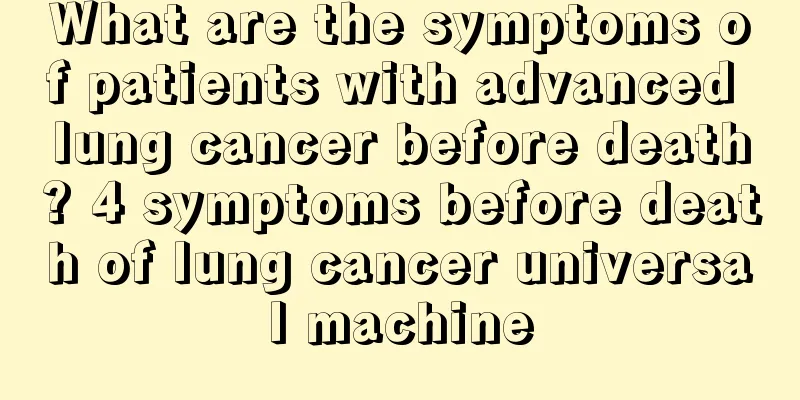Symptoms of inferior wall myocardial infarction

|
The health of the heart is an aspect that people always pay attention to, because the heart is one of everyone's core organs and plays an extremely important role in the health and integrity of life. Once the heart is diseased, it may cause serious problems and bring great damage to people's lives. For example, myocardial infarction is one of the common problems. Let's take a look at the symptoms of inferior wall myocardial infarction. About half of the patients with acute myocardial infarction have prodromal symptoms 1 to 2 days or 1 to 2 weeks before the onset of the disease. The most common ones are worsening of existing angina pectoris, prolonged attack duration, or worsening of the effect of nitroglycerin; or sudden onset of prolonged angina pectoris in those who have never had angina pectoris in the past. Typical symptoms of myocardial infarction include: 1. Sudden onset of severe, persistent, squeezing pain behind the sternum or in front of the heart Rest and sublingual nitroglycerin cannot provide relief and are often accompanied by irritability, sweating, fear, or a sense of impending death. 2. A small number of patients have no pain: they initially present with shock or acute heart failure. 3. Some patients experience pain in the upper abdomen, which may be misdiagnosed as acute abdomen such as gastric perforation and acute pancreatitis. A small number of patients experience pain in the neck, jaw, pharynx and teeth, which can be easily misdiagnosed. 4. Mental disorder: may occur in elderly patients. 5. Systemic symptoms: indescribable discomfort, fever. 6. Gastrointestinal symptoms: nausea, vomiting, abdominal distension, etc., which are more common in patients with inferior wall myocardial infarction. 7. Arrhythmia: seen in 75% to 95% of patients, occurring within 1 to 2 weeks of onset, more common within 24 hours. Ventricular arrhythmias are more likely to occur in anterior wall myocardial infarction, while bradycardia and atrioventricular conduction block are more likely to occur in inferior wall myocardial infarction. 8. Heart failure: mainly acute left heart failure, which is prone to occur within the first few hours of onset, or may occur several days after onset, and manifests as symptoms such as dyspnea, cough, cyanosis, and irritability. 9. Hypotension and shock: In acute myocardial infarction, severe pain, nausea, vomiting, sweating, hypovolemia, arrhythmia, etc. may cause hypotension. In large-area myocardial infarction (infarction area greater than 40%), cardiac output decreases sharply, which may cause cardiogenic shock, systolic blood pressure <80mmHg, pale complexion, cold and clammy skin, irritability or apathy, increased heart rate, and decreased urine volume (<20ml/h). |
<<: Can I go to the toilet if my water breaks
>>: Symptoms of premature rupture of amniotic fluid infection
Recommend
Can I wash my hair after straightening it for 48 hours?
Hair straightening is a common part of hair care....
Diet for patients with cardiovascular and cerebrovascular diseases
Everyone must have heard of cardiovascular and ce...
Lung cancer patients can use diet to regulate cough
Lung cancer patients may experience coughing symp...
What are some good treatments for advanced lung cancer metastasis
What are the good treatments for advanced lung ca...
What are the commonly used diagnostic methods for lung cancer? 4 diagnostic methods for lung cancer you should know
Lung cancer is a relatively harmful disease. In s...
How long do you brush your teeth before eating?
You need to brush your teeth after every meal. Th...
Routine test methods for thyroid function
Nowadays, more and more people are suffering from...
How does malignant lymphoma metastasize
How does malignant lymphoma metastasize? 1. Lymph...
The efficacy of fracture and contusion powder
The main effects of fracture and contusion powder...
Testicular cancer surgery Chinese medicine hospital
The living standards are constantly improving, bu...
The efficacy of yak horn comb
A yak horn comb is a comb made of ox horn. Combin...
Basal cell carcinoma may be skin cancer
If some symptoms occur on the skin, it may be an ...
What does functional constipation mean
Constipation is a very common phenomenon in daily...
Can nasopharyngeal carcinoma be operated on in the middle stage?
Can surgery be performed on nasopharyngeal carcin...
Comprehensive Treatment of Laryngeal Cancer with Traditional Chinese Medicine
The comprehensive treatment of laryngeal cancer w...









